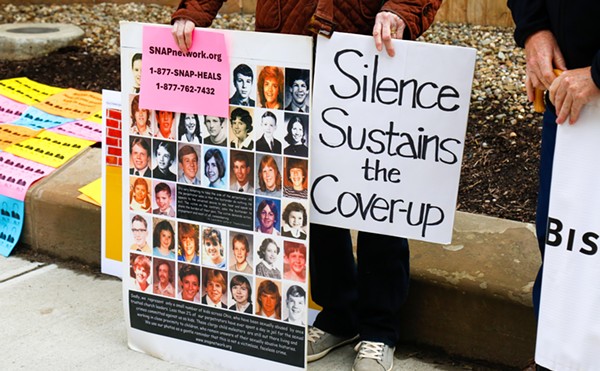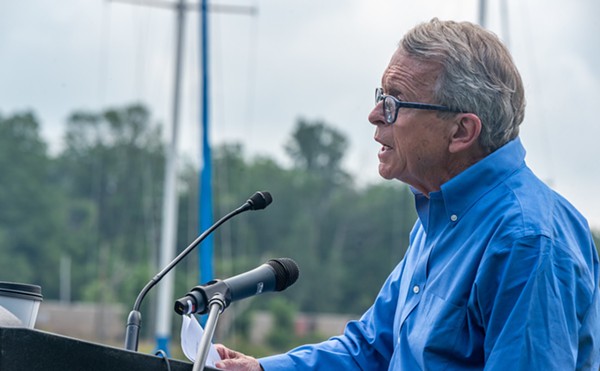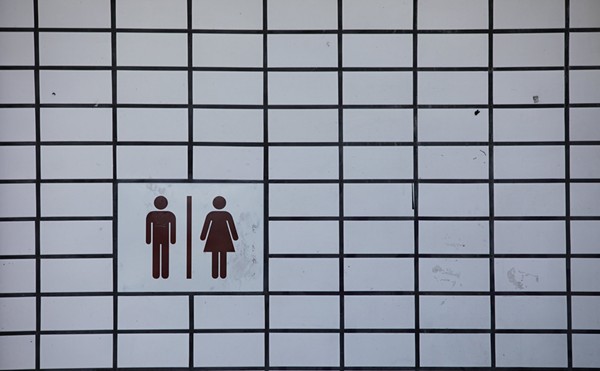After filing a letter of resignation in protest from her post at the helm of Kent State University's LGBT Studies program, professor Molly Merryman was asked to help form a new Center for the Study of Gender and Sexuality at the school. She withdrew her resignation and set to work. The new center will be a first for the state of Ohio, much like KSU's LGBT Studies program was a first when it was created in 2001. The hope is to begin operations sometime in the fall, thought Merryman and others are still working out the details. She spoke with Scene about the LGBTQ climate at Kent State and how the new center will complement the forward-thinking university.
Eric Sandy: It seems rather timely that we should be speaking on May 4. Could you tell me a bit about what led to your letter of resignation a few weeks ago?
Molly Merryman: In planning for next year and looking at, once again, our inability to offer anything other than an intro class and our lack of a budget, I really just felt discouraged. The other thing that was a catalyst was that we hired a full-time director for our LGBTQ Student Center. I'm confident in his abilities, and felt that if we had to have LGBT Studies go away to get the administration to pick up the program, I knew that by having the center in place that students wouldn't suffer. For a long time, the academic program was not just providing a curriculum and courses, but we were the visible people that students would go to when they needed help.
ES: Your letter obviously caught a lot of attention. When after that did you learn of the new Center?
MM: I sent the letter on a Thursday, and on Saturday the dean reached out to me. In his email, he basically said, "Not only am I going to fix this, but I'm going to make it better. But we need you back."
ES: Regarding the new Center for the Study of Gender and Sexuality, is this sort of institution common in the U.S.?
MM: I would say there are fewer than 20. It'll be the first in Ohio, though Ohio does have a Department of Gender and Sexuality at the Ohio State University. What you tend to have around Ohio are these ad-hoc programs that sometimes are funded better than other times. Program status tends not to have consistent funding and consistent faculty availability
ES: "Program" status as opposed to a literal "center," right?
MM: Right. Or a department.
ES: What were your initial thoughts when the dean approached you with this idea?
MM: [Arts and Sciences Dean] Jim Blank and I had had some conversations over the past year about such a center. It was always sort of a visionary idea, but we never had the backing for it. Definitely within the vision is that we want to bring together LGBT Studies and Women's Studies within the center, so that we can not only support those two programs as standalone academic minors, but we also want to pull together the curriculum and have a major in gender and sexuality. We also intend on taking our courses online. At Kent State, we have eight campuses. At some of our regional campuses, there's no women's studies or LGBT studies. We want to make sure that students can get involved regardless of where they're located. We also think there's opportunity for students from other universities to take these courses.
ES: Are there inclinations toward non-students, as well?
MM: Something that Jim and I are talking about is looking at having a graduate or adult learning certificate in cultural competencies in LGBTQ. That's something that Washington, D.C., has just proposed as a requirement for educators, health care providers, psychologists and social workers. We're thinking of taking this further because, as you mentioned, there's so much going on nationally and in the state of Ohio when it comes to LGBTQ rights. We really think that we can provide employers, political entities, and health care practitioners with that knowledge of this community.
ES: Something that I've noticed in my work has been the conversation that flows from a crime story or a rights story about the LGBTQ community. It's often a conversation about how to have a conversation -- whether that's straight-up terminology or more contextual and historical stuff. Is that the kind of thing that a center like this could promote awareness of?
MM: Absolutely. And I think one of the advantages that we would have as a center would be that we could pull together faculty expertise from a range of disciplines. If we want to do outreach into schools, we have a premiere education school here. I teach in criminology and justice studies, so it's definitely on my radar to be looking into ways I can partner with police departments. At Kent State University, we have a fully accredited police department, which is relatively rare. Among the things that they're very progressive on is training in issues of women -- in particular, women as victims -- and those more violent crimes that women are prone to be victims of, such as sexual violence.
ES: What sort of questions are students asking and what kind of work are they hoping to do after graduation?
MM: What we have found is that the majority of students taking the intro class and even taking the minor are not students who identify as LGBTQ. Certainly we have those students in the program, but mostly what we are seeing are students who are in criminology or a health care-related field who want to have that awareness and who really see that that will help them in their professional goals. From the LGBTQ students, there's definitely an excitement about the program getting back on its feet. We're going to completely rewrite the curriculum. They're excited also because they feel they were listened to. In particular, I heard from the president's office and the dean's office that what impressed them the most in that short time between my resignation and our announcement is that they were getting very positive letters and emails from students who were explaining how this program was important to them.
ES: You also mentioned how this center could be a visible magnet for students in need, regardless of whether they're in the program.
MM: There have been students who were considering Kent State University who I never saw becoming our minors, but it mattered to them that we had the program. I've had many students who have come to my office who aren't students in the program, but because of my visibility they come to me when they need help. For example, we started an emergency fund. We would have students who would come to Kent and get involved with Pride or another student organization and get comfortable and then go home and come out to their parents. Then their parents would cut them off from their finances. So we started an emergency fund, and we have a very responsive student services support system. Unfortunately, this still does happen. Some parents have mastered unconditional love when it comes to LGBTQ students. We make sure that there's support for students. We don't want to have to see a student drop out or be homeless because of their decisions to come out to their parents.
ES: Regarding familial support or the at-times overwhelming arguments and conversations surrounding LGBTQ issues, could you make the argument that having a center like this in Northeast Ohio might progress the dialogue and educate people who aren’t even remotely connected to Kent State?
MM: That’s definitely one of our goals. I believe that my having a visible center and by connecting with the media and public leaders, we can have a voice. I really anticipate that the Supreme Court is going to rule in favor of marriage equality. I think that grassroots organizations and state-level organizations will focus on things like employment non-discrimination. Marriage equality is just one aspect of equality. There’s tremendous discrimination against LGBTQ people. For example: adoption. You don’t have the ability for same-sex couples to adopt. There are limits on the rights that trans people have in the state of Ohio. There’s a lot of progress that needs to happen in our state, and I definitely think that our center can be a mechanism to help guide people.











